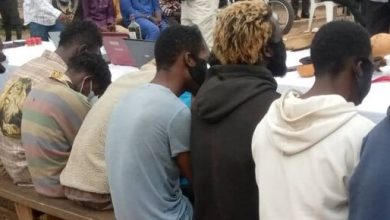
17-year-old boy hacked anti-crime commission’s chairman computer
A 17-year-old cybercrime suspect(namewitheld) has hacked the computer of Chairman of the Economic and Financial Crimes Commission (EFCC), Ola Olukoyede, a development which shocked the commission boss to bone marrow.
Penpushing reports that Olukoyede disclosed the development while speaking at the launch of a 24/7 Cybercrime Rapid Response Desk in Abuja, Federal Capital Territory (FCT), adding that the boy, demonstrated surprising computer proficiency that left him shocked.
The commission boss pointed out that the boy’s case underscores the need for societal change towards tackling the underlying motivations behind cybercriminal activities, stating that he decided to engage the boy, who is a first-year university student studying history, to let him demonstrate his acumen, his proficiency.

“And I gave him my laptop. ‘How do you do this, young man?’ By the way, he is not even studying science. He is studying history. But you need to see the proficiency. He opened my system and without giving him my password, he decoded my system. And I was there, shocked. I mean, this is not funny. I mean, that shows the skills that we have in Nigeria’, Olukoyede stated
“And before you could say that, he said, ‘Sir, which bank do you use?’ I said, ‘No, I’m not going to tell you that. I don’t want to demonstrate that in my office.’ But he was ready to probably go into my account’, he added
Penpushing further reports that the Chairman of the Economic and Financial Crimes Commission (EFCC) said he sought to know the motivation driving the boy’s cybercrime activities, adding that he confessed to him that he had to pay his school fees and there was no alternative
The anti-crime agency boss stated that from his encounter with 100-year-level student, he realised that this job can’t be left to Economic and Financial Crimes Commission (EFCC) law and it’s a collective responsibility, stressing the need to redirect such talents.
‘Why do you do this?’ And he told me because there is no alternative. He had to pay his school fees; a 100-year-level student. This job can’t be left to EFCC law. It’s a collective responsibility. We must change the narrative—from criminality to productivity and from cybercrime to cyberwealth,” he said.

Penpushing also reports that Olukoyede explained that as a means of achieving this, the agency would launch a cybercrime research centre with a Nigerian fintech company adding that, this centre will train at least 500 young Nigerians at a time in cybersecurity and various areas of cybercrime research.
The Chairman of the Economic and Financial Crimes Commission (EFCC) assured that training will occur during school vacations and will provide allowances as incentive to encourage participation, and called on the media and public to support this initiative, warning that cybercrime poses a growing threat to Nigeria’s economy and the youth.
Penpushing reports that Olukoyede described the menace as a burning challenge, corrupting family values and undermining young people’s potential, and stressed the importance of collaboration between federal and state governments.
The agency chieftain called on parents, schools, and civil society to combat internet fraud, noting that the future of the country depends on action against cybercrime, and that we cannot allow our youth’s potential to be wasted.
Penpushing further reports that the Nigeria’s first lady, Remi Tinubu in her keynote address called for urgent national collaboration to combat the growing cybercrime menace, particularly among the youth and underscored the economic and social threats posed by the increasing involvement of young Nigerians in online fraud.

“Cybercrime is an assault on our collective integrity, our economic stability, and the future of our youth. The youth’s participation in cybercrime threatens the nation’s quest for economic development and stability’, she said.
Penpushing also reports that Tinubu lamented that despite numerous arrests, the involvement of young people in cybercrime continues to rise, emphasizing that with more than 60 per cent of Nigeria’s population under 35, addressing the issue requires a collective, multi-sectoral response.
‘The youth’s participation in cybercrime threatens the nation’s quest for economic development and stability. “We must instill a culture of hard work, honesty, and dignity of labour among our youth’, she added
Penpushing reports that the first lady urged parents, law enforcement, schools, religious institutions, and the private sector to take an active role in guiding young people away from crime and toward productive, law-abiding lives, stressing the importance of modelling responsible behaviour and urged parents to instill values of integrity and patriotism in their children.
‘Criminal conviction has grave implications. No economy can thrive if its most active and talented youth are lost to crime. We cannot afford to have our young, creative talents excluded from national developmental efforts. The choices you make today will define your future and the future of Nigeria’, she said.

Penpushing further reports that Minister of State for Youth Development, Ayodele Wisdom while speaking pledged new approach to combat cybercrime, explaining that Nigerian government is shifting its strategy to fight cybercrime, focusing on youth engagement and economic support.
“For too long, we’ve viewed the EFCC as an adversary. But we are changing that. We aim to reduce cybercrime not through raids and intimidation, but by providing young people with opportunities and alternatives’, Wisdom said
Penpushing also reports that the Minister acknowledged the strained relationship between Nigerian youth and the government, especially regarding online fraud, emphasized the administration’s recent initiatives, including student loans and monthly stipends, to reduce financial pressures on the country’s youth.
‘The President has promised student loans, and beyond that, a monthly stipend to support students. We need to re-engineer our mindset. Aggressive youth engagement is key. Many who engage in cybercrime do so out of ignorance, and we want to guide them onto a better path’, he said.

Penpushing reports that he said the government in addition will provide Compressed Natural Gas (CNG) buses to students, addressing transportation challenges and further alleviating economic burdens, and acknowledged the widespread economic hardship in Nigeria, which he said is often used to justify criminal activity.
The Kwara State Governor AbdulRahman AbdulRazaq in his goodwill message at the event, praised national agencies such as the Economic and Financial Crimes Commission (EFCC) and the National Orientation Agency for their work in shaping the minds of Nigerian youth.
Penpushing further reports that the Governor declared that he was impressed with the efforts of these agencies, especially in schools and on social media, to address crime, drug abuse, and patriotism, calling for a broader national effort to define acceptable behaviours and preserve cultural values, noting that this would help tackle crime at its roots.
Meanwhile, the summit brought together experts and stakeholders to address the rising incidence of cybercrime, a critical issue in Nigeria, where economic challenges have driven many young people to online fraud.
FOOTNOTE: You want to share story with us? You want to advertise with us? You need publicity for product, or service, or event? Contact us on WhatsApp +2348073463653 or email penpushing@yahoo.com







